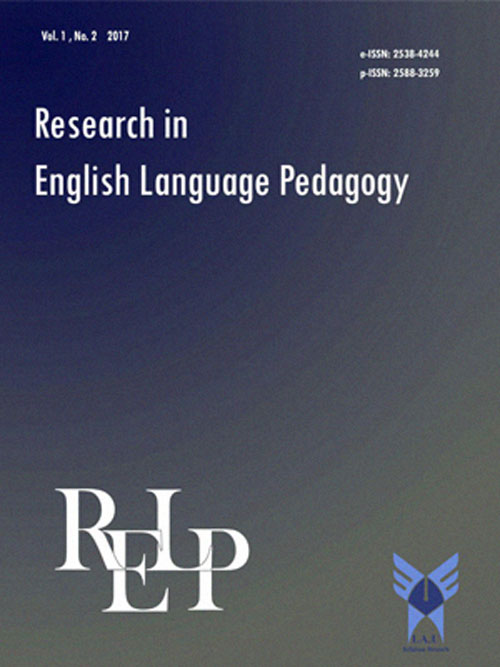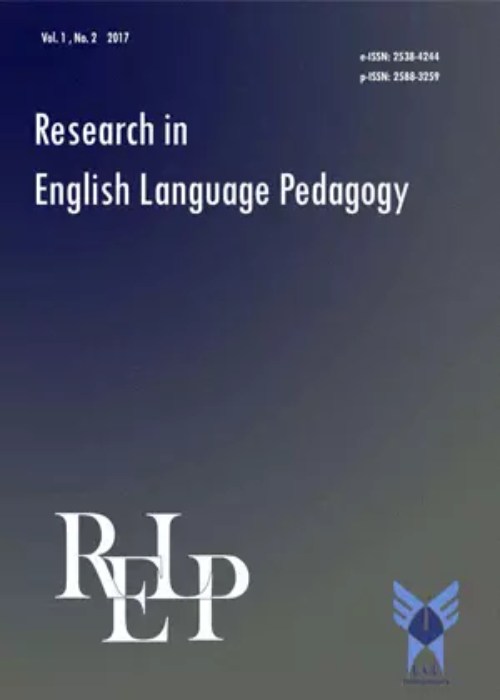فهرست مطالب

Research in English Language Pedagogy
Volume:5 Issue: 2, Summer-Autumn 2017
- تاریخ انتشار: 1396/09/20
- تعداد عناوین: 8
-
Pages 97-111The study aimed to scrutinize social networking effects on Iranian EFL learners vocabulary acquisition. Eighty Iranian EFL learners at the intermediate level participated in a pretest-posttest study after taking the placement test. They were then divided into an experimental group whose participants were supposed to equip their mobile phones or tablet PCs with a social networking application, that is, Line and form an online group to take part in eighteen virtual instructional sessions. Participants of the control group, however, underwent classroom learning during which target words were presented through routine classroom activities. Results of the independent-samples t-test in the posttest indicated that participants of the experimental group outperformed those of the control group. Results have important implications for both pedagogy and theory, especially socio-cultural theories of second language development.Keywords: CALL, EFL vocabulary, mobile learning, social networking
-
Pages 112-132The present research seeks to determine: (a) Iranian EFL learners application of suggestion semantic formulae ;(b) their attitude of appropriateness in terms of confidence in the employment of appropriate supportive moves; (c), their (im)polite mannerism with respect to the selected strategies; and (d) the relationship between attitude of appropriateness and mannerism of (im)politeness. An Oxford Quick placement Test (OQPT) was administered among 60 Iranian EFL learners to check their language proficiency level and to satisfy the assumption of homogeneity among the learners. These participants along with 10 American native speakers then underwent a suggestion DCT. The questionnaire included questions addressing interlocutors with higher, lower or equal power status and intimate or strange social distance. The DCT also involved attitudinal appropriateness scale and (im)politeness mannerism likert scale to examine the learners degree of confidence and mannerism. Besides similarities and differences in the application of suggestion semantic formulae between the Iranian learners and American speakers, the results revealed variations in the two groups performances for appropriateness and (im)politeness. The results also indicated a positive relationship between the attitude and mannerism scales.Keywords: Pragmatic awareness of Suggestions: From (Im)Polite Mannerism to Attitudinal Appropriateness
-
Pages 133-146Truly, note-taking plays a pivotal role in consecutive interpreting, particularly where methodical note-taking is used. In the absence of Iranian research in this respect, the present study investigated the process of note-taking in Persian-English consecutive interpreting in order to clarify how exactly the notes are taken by the professional interpreters and how much they are familiar with note-taking and the related concepts. For the purpose of this paper, five Iranian interpreters were selected meticulously and by means of observation and phone interview, the required data were collected. Next, the notes taken by the professional interpreters were reviewed and classified based on several factors such as the use of abbreviations and symbols and the source or target language preference; also, the replies given via the phone interview were transcribed and codified in order to answer the research questions. The research findings showed that the majority of Iranian professional interpreters had passed no course regarding to the note-taking skill in general and they rarely used symbols in their notes and wrote words in letters, mostly in full forms in target language in particular. It implies that they took notes based on their experiences irregularly rather than the rules and principles. Consequently, there is an urgent need for a note-taking guideline especially in Persian-English consecutive interpreting; also, considering the effect of note-taking on their performances, Iranian interpreters should be more familiar with the academic aspect of this skill.Keywords: Iranian professional interpreters, Note-taking, Note-taking guideline, Persian-English consecutive interpreting
-
Pages 147-166Considering the tenets of Sociocultural Theory with its emphasis on co-construction of knowledge, L2 writing can be regarded as a co-writing practice whereby assistance is provided to struggling writers. To date, most studies have dealt with peer scaffolding in the revision phase of writing, as such planning and drafting are remained untouched. The present study examines the impact of peer scaffolding on writing accuracy of a group of intermediate EFL learners, and explores scaffolding behaviors employed by them in planning and drafting phases of writing. To these ends, 40 freshmen majoring in English Language and Literature in the University of Guilan were randomly divided into a control group and an experimental group consisting of dyads in which a competent writer provided scaffolding to a less competent one using the process approach to writing. Results of independent samples t-tests revealed that learners in the experimental group produced more accurate essays. Microgenetic analysis of one dyads talks showed that scaffolding behaviors used in planning and drafting phases of writing were more or less the same as those identified in the revision phase. These findings can be used to inform peer intervention in L2 writing classes, and assist L2 learners in conducting successful peer scaffolding in the planning and drafting phases of writing.Keywords: academic writing, Interaction, Microgenetic Analysis, Peer Scaffolding, Writing Accuracy
-
Pages 167-180The present study was an attempt to investigate and compare the efficiency of the new and the old first grade high school English textbooks by focusing on thirty teachers and three hundred learners attitudes through a textbook evaluation checklist and a questionnaire. The analysis of the results revealed that, with regard to teacher's attitude toward the two books compared with each other, these books were nearly the same with regard to pronunciation and exercises. The old book was considered more efficient regarding grammar. Regarding the rest of the items, the new book was more efficient. Taking the learners perspective into account toward these two books compared with each other, there were no noteworthy difference between the books regarding vocabulary. Regarding the other items, the new book was considered more efficient. The findings of this study can assist decision-makers to pay more attention to the evaluation of textbooks and consequently the selection of an appropriate book according to the teachers and learners expectations, needs and interests.Keywords: Evaluation, evaluation checklist, textbook, teacher's belief
-
Pages 181-202This study aimed to investigate EFL learners request strategies to faculty to see whether politeness is interpreted differently or similarly across gender and different levels of language proficiency in text-based synchronous computer-mediated communication (SCMC). Data included initial semistructured interviews with 4 EFL instructors and 10 college EFL learners. Based on the interviews, an online task was developed that included request situations that were most likely to occur in real life in SCMC settings. Having administered the Oxford Quick Placement Test (OQPT), the online task was completed by 99 lower-intermediate and 118 upper-intermediate EFL learners in 4 universities in Iran. Participants request strategies were coded and analysed to explore the possible differences. Chi-square findings suggested that gender had no relations with the choice of request strategies by the participants to faculty in SCMC; however, level of proficiency made a difference. This research provides guidelines for course designers to generate appropriate pedagogic guidelines for EFL learners in their hierarchical relationships with their teachers.Keywords: Request Strategies, Gender, Proficiency, Synchronous Computer-Mediated Communication (SCMC)
-
Pages 203-222The current study was an attempt to explore the relationship between Iranian EFL learners self-regulatory capacities and their argumentative writing task performance in order to analyze measures of complexity, accuracy, and fluency (CAF). To this end, 44 Iranian EFL undergraduates majoring in English literature at the University of Tehran were recruited based on convenience sampling to participate in this study. Employing a correlational design, the participants were required to perform an argumentative writing task and complete the Motivated Strategies for Learning Questionnaire designed by Pintrich, Smith, Garcia, and McKeachie (1991). Pearson product moment correlation indicated a significant relationship between self-regulated learning and writing task performance in relation to CAF measures. In addition, the results of multiple regression showed that resource management strategies and value component predicted 56.9% of grammatical accuracy of writing task. It was also shown that resource management strategies, value, and expectancy components predicted 56.5% of lexical complexity of writing task. Lastly, cognitive and metacognitive strategies, expectancy, and value components predicted 55.2% of the fluency of writing task. The findings of this study informs EFL writing pedagogy and English language teachers and syllabus designers with regard to the benefits of applying self-regulatory strategies in teaching and assessing writing.Keywords: Argumentative Wri ting Task_EFL undergraduates_Motivated S trategies for Learning Questionnaire_Self-Regulatory
-
Pages 223-246This study intended to investigate the imposition of values and ideological patterns of particular societies affecting learner's identity as a result of globalization and linguistic imperialism in the internationally distributed textbooks which are developed to meet the English language needs of international learners and are broadly used in Islamic countries like Iran. It was important to work out whether violation of standards and ideological patterns of certain societies could be detected. For that reason, critical discourse analysis (CDA) with its theory and procedures, as developed by Fairclough (1989), used in conversations, illustrations and reading passages in Interchange, Four Corners, Top Notch and American English File series and three meaning dimensions the textbooks content, the social relations of the characters in the textbooks, and their subject positions were classified and analyzed statistically. Overall, the findings of this study represented that these ELT books are by some means unfair and inclined to signify a specific discourse type, that is, the Western culture discourse, ideological patterns, and consumer societies, which can impose the Western view and have different effects on student's identity in Islamic countries.Keywords: course content, globalization, ideology, linguistic imperialism


